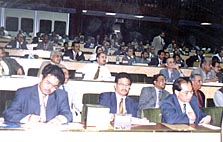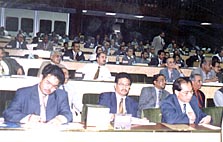
After the Emigrants Seminar is Over Words Have Been Spoken, Now Deeds Must Follow [Archives:1999/16/Law & Diplomacy]
April 19 1999

“Emigrants are the Main Source of Continuing Development” was the title of a seminar held recently by the consultative council and the Ministry of Emigrants Affairs. It ran from 10-13 of April, 1999. 49 papers were discussed during the seminar that discussed various issues and contributions of immigration and expatriates in 4 areas: Historically, economically, socially, and culturally.
These aspects were comprehensively discussed by the members of the committee, and they came up with many constructive notes that aimed to increase the role of emigrants and make their lives easier. The Consultative Council stressed the importance of holding the Emigrants First Conference in mid May and mobilizing everyone for the purpose of holding this important conference, which calls for participation on the part of emigrants. They also stressed that they would provide all facilities to help the conference achieve its goals, and implement its resolutions so that they can serve the country’s interests as well as the citizen’s.
The Council stressed the importance of completing the Yemeni emigrants survey abroad which was started last year by the Ministry of Emigrants Affairs. The purpose of the survey is to take part in providing welfare and services to the emigrants, make use of the development programs inside the country and give the emigrants a practical participation in the investment and economic development process. The council hailed the great efforts of the Yemeni emigrants in supporting the national move ment and the process of development.
Mr. Abdul Aziz Abdul Ghani, Chairman of the Council, pointed out that the country had depended heavily on emigrants assistance before the discovery of oil. Their participation, through the transfer of money to the country, are still vital to the national economy and the investment and development process in the country.

1. Any Yemeni emigrant in any part of the world can have a Yemeni passport without any complications that other countries impose for the purpose of limiting passports issuing from inside.
2. Reduction of passport fees, the last reduction occurred in 1998 within the Cabinet resolution No. 268 that states the following:
-The fee for a Yemeni emigrant passport is $80 instead of $100.
-The fees for Yemeni students or dependents of a Yemeni emigrant is $25 instead of $100
-The fee for other Yemeni emigrants descendants (apart from students or dependents) is $ 50 instead of $ 100.
3. The Yemeni citizenship law included some advantages to the Yemeni emigrants, especially those that permit him/her to hold the citizenship of the country he/she is living in, besides having the full rights of Yemeni citizenship.
4. Yemeni emigrants marrying foreign spouses from the country they are residing in can obtain Yemeni citizenship for their spouses after four years of marriage.
Children of Yemeni emigrants by foreign mothers obtain Yemeni citizenship according to the law as long as they have documents to prove the identity of their Yemeni father such as a birth certificate, passports of the father or the mother, or the ID of the father.
5. Yemeni emigrants with foreign passports are not required to obtain entry and exit visas; the Immigration, Passports and Citizenship Authority issues such visas free of charge.
A paper was presented by Dr. Ali Ohood Baabad Dr. Abdulla Saleh titled “Hadramout; a Relationship of Homeland, Sorrows and Estrangement.” The paper indicated that the Unification State paid special care to Yemeni emigrants, and a special ministry was founded for his/her affairs, projects and troubles. But still the relationship between emigrants and the country’s institutes requires more coordination of efforts and laying down necessary plans for communication to guarantee their active participation in the development plans. Both Dr. Baabad and Dr. Saleh mentioned in their papers that living as emigrants does not mean a perfect situation, but the country benefits from them by receiving hard currency inside. Besides their participation in economical and social development and in many other aspects. Many risks arise, for instance a state of less self-dependence in solving society’s problems and implementation of development programs plus a reduction of local manpower and the loss of highly qualified people.
They concluded their paper by saying: “Despite the country’s concerns over emigrants we find that the capital investments of Yemeni in general and Hadrahmis in particular has not been enough, especially since they have huge amounts of capital abroad, are less than the expected level.”
Such a matter requires a serious joint stand from the government and the people to guarantee positive and practical participation of emigrant capital in the total process of development of the Yemeni country on the level of small or large projects.
Dr. Abdul Wali Al Shemeri, Director of the Creativity Institute for culture and arts, presented a paper on famous Yemeni emigrants, Dr. Shemeri mentioned number of well-known Yemeni figures who emigrated to various places in the world.
Chairman of the Board of Aden Chamber of Commerce and Industry, Sheik Mohammed Omer Ba Mashmous, presented a paper titled “The Role of the Private Sector in Comprehending the Emigrants Investment.” Sheik Ba Mashmous stated that: it is time to attract emigrants’ capitals to invest in their homeland. Such an act will represent a perfect solution for the Yemeni economical difficulties, and the best way to connect Yemeni emigrants with their country. Establishing a suitable investment atmosphere in Yemen will attract emigrants’ capitals, as well as having a private sector willing to comprehend emigrants’ investment demands. The following factors are necessary as a preparation of the investment atmosphere:
1.Providing the private sector inside the country with all facilities and removing obstacles.
2.Reconsidering certain laws and legislation.
3.Control corruption, as the President of the Republic has stressed in fighting corruption and corrupted people
4.Improve and activate the role of governmental institutes to reach a level of holding responsibility.
5.Rehabilitate qualified cadres and employ them on the Republic’s entry gates (air, land and sea) to welcome emigrants. The first thing the visitor sees is the ports of the country where he can make his first impression.
6.Sheik Ba Mashmous mentioned that the Aden Chamber of Commerce and Industry worked hard to promote investment in Yemen and held many seminars and conferences, visiting many countries aiming to urge emigrants to have more ties with their country.

The Chief-Editor of Al Watan newspaper, the mouthpiece of the Ministry of Emigrants Affairs added that such seminar has a positive role and wide audience, while the negative affects have minor role. The seminar was supposed to present a main paper by the Ministry of Emigrants Affairs, its past, present work and future plans.
The speech of the Minister of Emigrants Affairs, Dr. Ahmed Al Bishari, clarified the efforts of the ministry to solve all emigrants affairs, he indicated that there are many plans laid down by the ministry that looks forward to bring them to pass through cooperation with various concerned parts. The Minister stressed the importance of the participation factor for continuous development for all, inside and outside the country, and the emigrants have a basic role in the development process.
Great concern was shown by the political leadership towards the emigrants sector, the ministry holds great expectations on the coming conference on the investment sector, promoting a suitable atmosphere for the country. Many parts are cooperating with the Ministry to guarantee success for such a conference, besides other groups aiming to solve emigrants’ issues.
Mrs. Al Hawati added that many cases were presented regarding the emigrants’ difficulties, especially the ID case which many emigrants suffer from and which should be resolved soon. Besides the case of nationalized lands, where the Governor of Hadramout, Mr. Saleh Obad Al Kholani, solved this matter for a citizen of the province successfully. Other provinces such as Aden and Yafee still need solutions and their citizens are looking forward to get a decision on this regard the same as in the Hadramout.
The seminar presented many useful ideas such as:
¥Laying down certain mechanisms to deal with emigrants.
¥Solve the current emigrants’ issues.
¥Finalize the cases of providing more facilities to emigrants and the ID issue, besides having more discounts on passport fees.
¥Foundation of a study and data center at the Ministry of Emigrants Affairs. Some people called such center a database that could assist in the process of scientific researches regarding the phenomenon of immigration.
Mr. Hisham Ali Al Saqqaf, General Manager of TV and radio Production in Sayoon, presented a paper titled “Emigrants Participation in Development Projects in Hadramout”. He stated that emigrants coming from Indonesia and East Asia bought many lands and held beneficiary projects such as Al Nahdha Schools in Sayoon, Terim Tie, Al Habashi Tie and Dar Al Sadaqa in Terim. The profits of these lands provide a continuing source for the projects.
Other developed projects in Hadramout valley between the period 90-98 after unification were things such as building roads and hospitals, as well as other projects for rural development.
The paper was concluded by offering the following recommendations:
First: The great privileges of Investment Decree No. 22 for the year 1991 did not attract much investment by emigrants, or convince them to employ manpower and provide profit to the country, some obstacles stand in the way, such as:
1.No efficient infrastructure services as electricity, communication, etc.
2.No efficient correct information and data to study the benefits of investment projects.
3.Delaying investors cases as soon as they reach courts.
4.Clashes in investment law implementation with some concerned taxes and customs Authorities, such acts would form a doubtful image for the investor regarding the law.
5.Bureaucratic procedures with concerned institutes.
6.Having no industrial bank specialized in lending investment projects.
7.Amending the law of income tax no. 31/91, which is unsuitable to the privileges of the investment law.
8.Required comprehensive plans of investment areas in each province (agricultural – fishery – industrial – tourist) to be provided to the investors.
9.Preparation of studies on economical profits besides the provision of plans in various investment areas and promoting such variety among emigrants and investors.
Second: Some offices of the Ministry of Emigrants Affairs in some governorates have to be activated, besides finding a useful mechanism to deal with emigrants affairs inside and outside Yemen, a recommendation to open a minister’s office in Hadramout and the desert.
Third: It is quite important to activate the role of our embassies abroad with Yemeni emigrants and tighten their relationship with their homeland, these embassies should be the main source of detailed information regarding issues related to investment and development of the country.
Fourth: The government should take some procedures that aim to strengthen the emigrants relations with their homeland such as:
1.Exempting emigrants’ children who study in Yemen from residence fees, AIDS Test fees and other fees.
2.Provision of scholarships at Yemeni Institutes, Colleges and schools of higher education for the emigrants’ and expatriates’ children.
3.Delegating Yemeni teachers to travel abroad in Asia and Africa for the purpose of teaching Yemeni emigrants’ children.
4.Holding periodical cultural festivals in these countries to introduce Yemeni civilization and folklore. This would aim to assist in promoting Yemen among emigrants and foreigners.
By- Ahlam Al Mutwakel
——
[archive-e:16-v:1999-y:1999-d:1999-04-19-p:./1999/iss16/l&d.htm]


